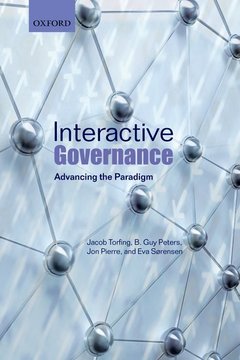Interactive Governance Advancing the Paradigm
Langue : Anglais
Auteurs : Torfing Jacob, Peters B. Guy, Pierre Jon, Sørensen Eva

Governance has become one of the most commonly used concepts in contemporary political science. It is, however, often used to mean a variety of different things. This book helps to clarify this conceptual muddle by concentrating on one variety of governance-interactive governance. The authors argue that although the state may remain important for many aspects of governing, interactions between state and society represent an important, and perhaps increasingly important, dimension of governance. These interactions may be with social actors such as networks, with market actors or with other governments, but all these forms represent means of governing involving mixtures of state action with the actions of other entities.This book explores thoroughly this meaning of governance, and links it to broader questions of governance. In the process of explicating this dimension of governance the authors also explore some of the more fundamental questions about governance theory. For example, although governance is talked about a great deal political science has done relatively little about how to measure this concept. Likewise, the term multi-level governance has become widely used but its important to understand that idea more fully and see how it functions in the context of interactive forms of governance. The authors also link governance to some very fundamental questions in political science and the social sciences more broadly. How is power exercised in interactive governance? How democratic is interactive governance, and is democratic governance always advanced through transparency?
Introduction. 1. The Governance Debate and the Rise of Interactive Governance. 2. Governance in other Disciplines: One Approach or Many?. 3. Power and Politics In Interactive Governance. 4. Measuring Governance. 5. Horizontal, Vertical, and Diagonal Governance. 6. Institutionalizing Interactive Governance. 7. Metagovernance: The Art of Governing Interactive Governance. 8. New Roles and Role Dilemmas in Interactive Governance. 9. Assessing and Improving Effective Interactive Governance. 10. Assessing And Improving The Democratic Quality of Interactive Governance. 11. Transparency and Governance. 12. Conclusions. References.
Jacob Torfing teaches political science, political theory and public administration. He is the director of Center for Democratic Network Governance and vice-direction of the large-scale research project on Collaborative Innovation in the Public Sector. He is Professor in Politics and Institutions at Roskilde University in Denmark. B. Guy Peters is an honorary professor at the City University of Hong Kong. He is author or editor of over 60 books and is currently founding co-editor of the European Political Science Review. He is Maurice Falk Professor of American Government at the University of Pittsburgh and also Distinguished Professor of Comparative Governance at the Zeppelin University in Germany. Jon Pierre holds adjunct professorships at the University of Pittsburgh and University of Nordland in Norway. He has published extensively on theories of governance, public administration and urban politics. He is co-author (with Guy Peters) of Governance, Politics and the State (Palgrave, 2000) and Governing Complex Societies (Palgrave, 2005) and editor of Debating Governance (Oxford University Press). He is Professor of Political Science at the University of Gothenburg. Eva Sørensen is a long time student of public sector reform in Western liberal democracies. Her main focus has been on how interactive forms of governance that bring public and private actors in to close collaboration has affected the capacity of the public sector to provide effective and democratic governance. In recent years her interest has turned towards the question of to what extent and how interactive forms of governance can contribute to enhancing public innovation. She is currently direction of huge research project called 'collaborative innovation in the public sector' which is financed by the Danish strategic research council.
Date de parution : 08-2019
Ouvrage de 296 p.
15.5x23.4 cm
Date de parution : 01-2012
Ouvrage de 284 p.
16.2x24 cm
Thème d’Interactive Governance :
© 2024 LAVOISIER S.A.S.



